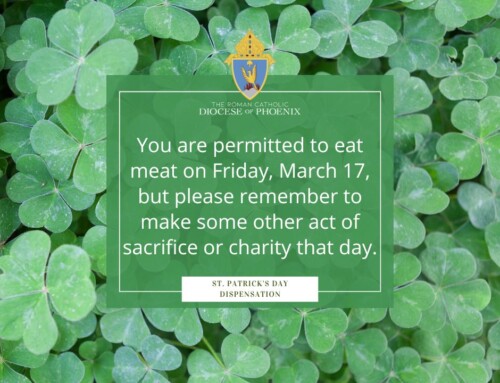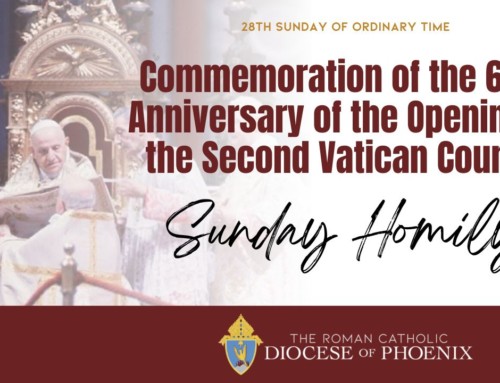Following is the prepared text from Bishop Olmsted’s homily for the 15th Sunday in Ordinary Time.
July 12, 2020
When St. John Vianney preached in his parish in Ars, France, people’s lives were changed. No one asked for autographed copies of his homilies. But when he spoke in the pulpit or the confessional people listened – not so much to him as to Christ speaking through him. As a result, many let go of their despair, placed their hope in the Word of God and began to trust that Jesus could turn their lives around. St. John Vianney’s witness to Christ was successful because he was a sower of God’s word, not his own agendas.
In our First Reading from Isaiah the Prophet, the Lord says,
“Just as from the heavens the rain and snow come down and do not return there till they have watered the earth, making it fertile and fruitful, …so shall my word be… [it] shall not return to me void, but shall do my will, achieving the end for which I sent it.”
When God spoke through the Prophet Isaiah, His Word had exceptional power, capable of overcoming every obstacle and bringing to completion the mission for which he sent it. The people had not expected the Lord to speak to them so tenderly; for they had strayed like sheep, wandering far from Him. But God, in His mercy, reminded them of the power of His word to rescue and restore their lives.
In a similar way, through the antiphon of the Responsorial Psalm today, during this difficult time caused by the pandemic, the Lord announces similar good news, “The seed that falls on good ground will yield a fruitful harvest” (Lk 8:8). The seed of God’s word bears much fruit in the lives of whoever takes it to heart.
In our Second Reading, today, St. Paul proclaims with great enthusiasm (Rom 8:18), “…the sufferings of this present time are as nothing compared with the glory to be revealed for us.” This is not wishful thinking. It is the truth, the living word of God, which is worthy of our complete confidence.
In the Gospel today, the Lord Jesus tells the parable of the sower to show the abundant mercy of God. The sower goes out and throws seed everywhere – not only in the most promising fields, but everywhere and in every direction – on the footpath, on rocky ground, and among thorns. As a result, three-fourths of the seed fails to produce fruit because it lands in places with adverse conditions. But it makes no difference to the Sower. Even though only a fourth of the seed falls on good soil, it still produces an abundant harvest. That’s how the Lord deals with you and me. He shepherds us at all times, not just when we are virtuous but even when we fail. In fact, He goes in search of the lost sheep, leaving the other 99 behind. Just as He was happy to be known as a friend of tax collectors, prostitutes, and other sinners in Galilee, so today He seeks us out when we have gone astray.
It is instructive to recall when Jesus first told the parable of the sower. It was not in the excitement of those early days of His public ministry when He was attracting large crowds in Galilee. There had been an initial stage of great success – with His wondrous miracles and spell-binding teaching in the synagogues and along the seashore. But then, a second stage came, one marked by disillusion and doubt. The Sadducees opposed Him; the Scribes made plans to kill Him. The “learned and clever” were disillusioned by His association with the poor, and the Pharisees were scandalized by His love of sinners.
Objections were being raised, such as, “If you are the Messiah, then work miracles here in our town like you did in Capernaum.” Others asked, “Why does He eat with tax collectors and sinners?” Even when Jesus fed more than 5000 with five loaves and two fish, the crowd became disillusioned when He went on to talk about Himself as the Bread of Life. In fact, most of His followers deserted Him at the time, saying “How can He give us His flesh to eat?”
Jesus did not give the people what they wanted; He gave them what they needed.
How do we measure success in life? In the Parables of the sower, three of the four sowings yielded no harvest! Nonetheless, in the end, “Some seed fell on rich soil, and produced fruit, a hundred or sixty or 30-fold.”
Not all words have equal power. There is a great difference between the words of men and the word of God. As St. Paul wrote to the Thessalonians (1 Th 2:13),
“We give thanks to God unceasingly, that, in receiving the word of God from hearing us, you received not a human word but, as it truly is, the word of God, which is now at work in you who believe.”
God greatly desires to speak to us. That is why Jesus says: “Whoever has ears ought to hear;” and “Blessed are your eyes, because they see, and your ears, because they hear. …many prophets and righteous people longed to see what you see but did not see it, and to hear what you hear but did not hear it.”
Yesterday, the Church throughout the world celebrated the Feast of St. Benedict, the father of Religious Life in the Western Church. His Rule of Life continues to this day, more than 1500 years after his death, to be a source of great wisdom. The first word the Rule sets the tone for the whole document: “Listen!” The path to holiness that Benedict taught not only to monks but to us all is found in that one word: Listen! Incline your heart to the voice of the Lord. Open your soul to the living word of God.






